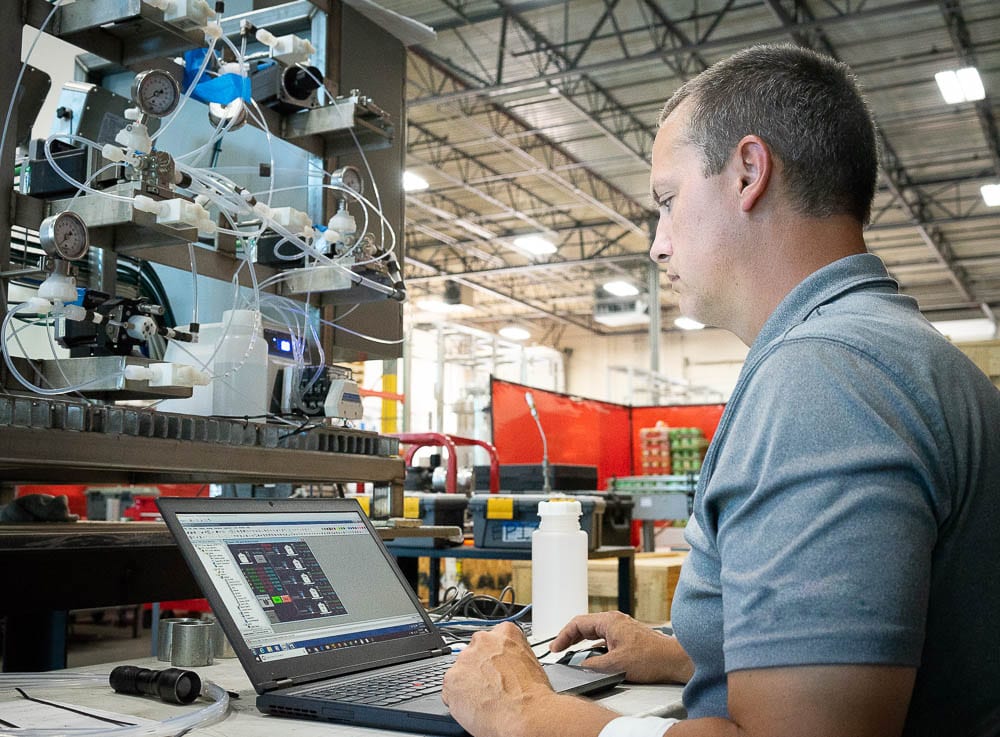
As long as the automation engineering company is approved to program name-brand software, I can trust them to integrate my automation system. Right?
Not necessarily. Carefully vetting an automation integrator is as important as vetting candidates for an in-house position at your company. Successful candidates should be innovation savvy, knowledgeable about security risks, and willing to accommodate your unique professional needs.
These are the top 10 qualifications to look for when interviewing automation engineering companies. If you want an automation integrator that cares about your project outcome as much as you do, these are the questions you should ask.
1) Does your project scope match the integrator’s expertise areas?
This first question is actually for you. Before you can find the perfect integrator you need to create a clear definition of your project scope. If you don’t have all of the scope details yet, that’s okay. Start by simply outlining the major systems that will be affected and what end result you are aiming for.
If you want help developing your project scope, you can always call an automation integrator to step in as a consultant first. A good automation engineering company can help you outline the project scope and point you to specific experts in areas outside their normal jurisdiction if needed.
2) Is the candidate willing to conform to your existing automation systems?
If you’re running a process plant (or a corporation with multiple plants) it’s critical to limit your search to automation engineering companies that are comfortable adapting to your existing documentation methods, preferred programming style, and nomenclature. It’s surprising how many companies refuse to do this.
Integrators who want to bulldoze you won’t work out in the long run – narrow your field of candidates here. While their proposed system may be highly functional on its own, its value is nullified if it won’t play well with your other systems. This makes the system hard to adopt, take ownership of, maintain and add onto later. You want an integrator that is friendly, flexible and experienced with a variety of systems.
3) How will the integrator test the system before delivering it to you?
The candidate should have a process in place for testing instrumentation before building it into the automation system to ensure nothing malfunctions for you, the customer. Have them explain to you how they can put themselves in your shoes. Can they fully simulate your process prior to installing it in your plant? What QA documentation do they provide?
4) Will the candidate train your team and support you after integrating the system?
After the system has been tested, installed and fully integrated – then what? Many automation companies will call it quits. This can leave you high and dry or they will start charging by the hour for “out-of-spec” troubleshooting.
Top-notch automation engineering companies will train your line operators before handing over the controls. New processes inherently lead to new questions, so you want an integrator who will stick with you until you’re comfortable running things on your own.
The best way to determine which kind of company you are talking to is by requesting references. Call those references and specifically ask about startup, checkout, and after installation support. Did everything go smoothly? If not, was the integrator there to support their clients or were they hard to reach and/or expensive to keep on-board? Kindly say goodbye to anyone who won’t support your project after installation.
5) What is the candidate’s policy on selecting vendors for projects?
Be wary of integrators with exclusive vendor agreements. There isn’t one manufacturer that can meet the needs of every industrial automation project. Different scale projects require different scale solutions.
Such candidates will present these agreements as cost savers, but in reality, it only makes things easier for themselves. Companies that insist on their exclusive vendors often try to jam the proverbial square peg in a round hole.
You want systems and equipment that work with your existing brands and platforms, meet your specifications, and are not jerry-rigged to do so. Choose an automation engineering partner who is willing to shop around and spend your money like it’s their own.
6) Can the candidate securely integrate with your plant network?
This will empower you to manage your data more efficiently. By integrating your industrial automation controls with your plant network, you are able to track process data offsite, monitor raw material levels, and even program the automatic ordering of more raw materials when levels get too low.
In order to do this, you’ll need to refine your hiring search to IT-savvy integrators. Only hire a candidate that takes IT restrictions and compliances into consideration before designing, programming and installing the industrial automation system. This will help you avoid costly upgrades and fixes down the road.
7) Does the candidate know practical applications for “Industrial Internet of Things” (IIoT) or is it just a buzzword to them?
The ability to take advantage of smart sensors that generate and report their own data, and to push that “big data” into the cloud has made it possible to analyze your entire process in a way that was previously difficult, if not impossible.
Before IIOT it was too expensive to retain this data beyond a certain number of years (limited space means deleting old data) cloud storage today can be purchased in quantities of hundreds of terabytes. Storing this data in the cloud makes it affordable to not only collect larger amounts of data, but to retain that data permanently and monitor historical trends over time.
Getting to the internet securely is key to unleashing all of that potential. Have the integrator explain how they can make this happen without opening a window for competitors to steal company secrets, damage products or hurt production. IIOT is often a buzzword that integrators throw around, but they should be able to offer some practical suggestions on how to start harnessing the power of IIOT without overhauling your entire plant.
8) Does the integrator have experience with your industry specifically?
This one is pretty simple. Does the integrator have someone who fits the bill on their team? Ask for the project manager’s resume.
In fact, ask for resumes for the whole team! If you’re automating an industrial chemical process, you want to ensure that there is a wealth of industry knowledge at your disposal. Project examples, photos, and details on what types of work were completed should be easy for experienced teams to provide. Don’t be shy about asking.
9) Does the quote provided by the candidate offer a complete price?
Are you positive that the price you’ve been quoted includes everything that you need with your system? Is the candidate asking smart questions that help them fully understand the scope of your project, or are they just quoting what you asked for, knowing that there are details missing?
Ask for a proposal that fully addresses the entire scope of your project, including a special section that specifies what is not included. The level of detail included in the quote typically indicates the attention to detail you can expect from their designers, programmers, electricians, and craftspeople.
10) How soon should automation engineering companies get involved?
“Now” is the only acceptable answer. An integrator who truly cares about providing an optimal automation solution will want to partner with you and get involved as soon as possible.
By getting involved during the controls and automation design phase, the integrator has ample opportunity to guide you through the process and ensure successful integration and startup. An integrator that is looking for a partnership, is interested in making this a win-win for both themselves AND you.
Now that you’re ready to begin vetting candidates, call EPIC Systems and put our 30+ years of industry knowledge and experience to the test. Call us at 314-806-1678
